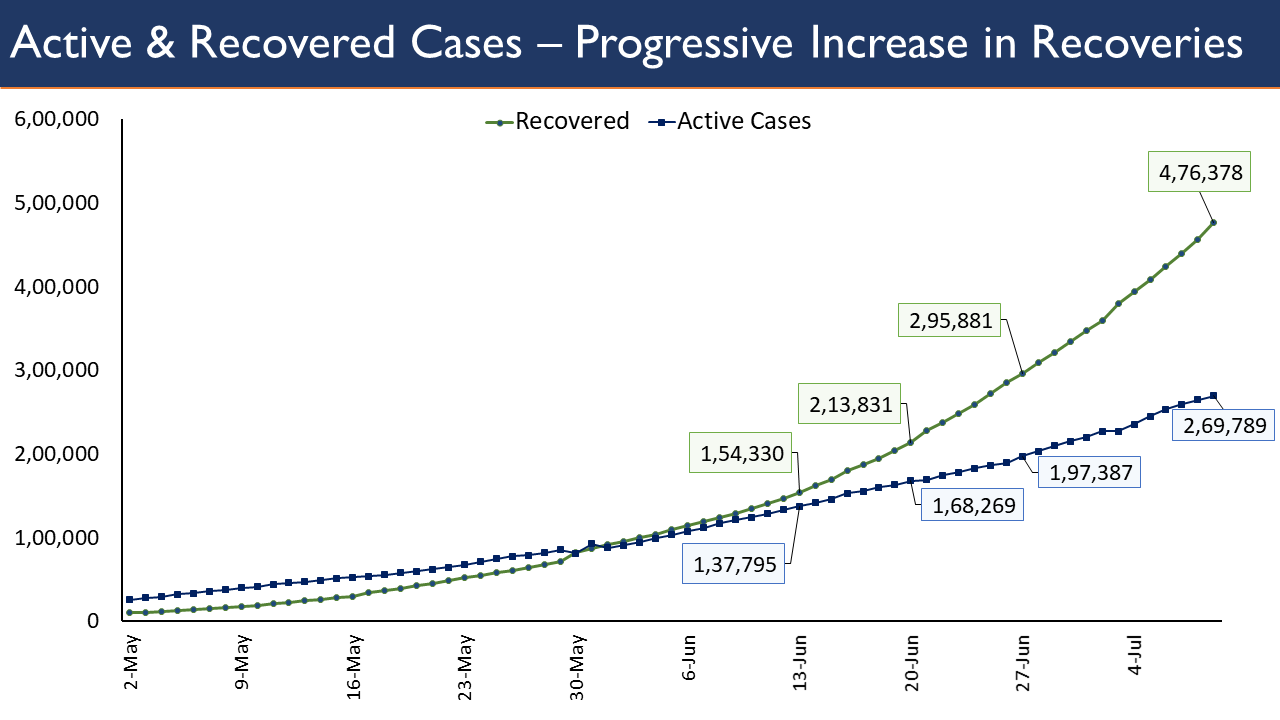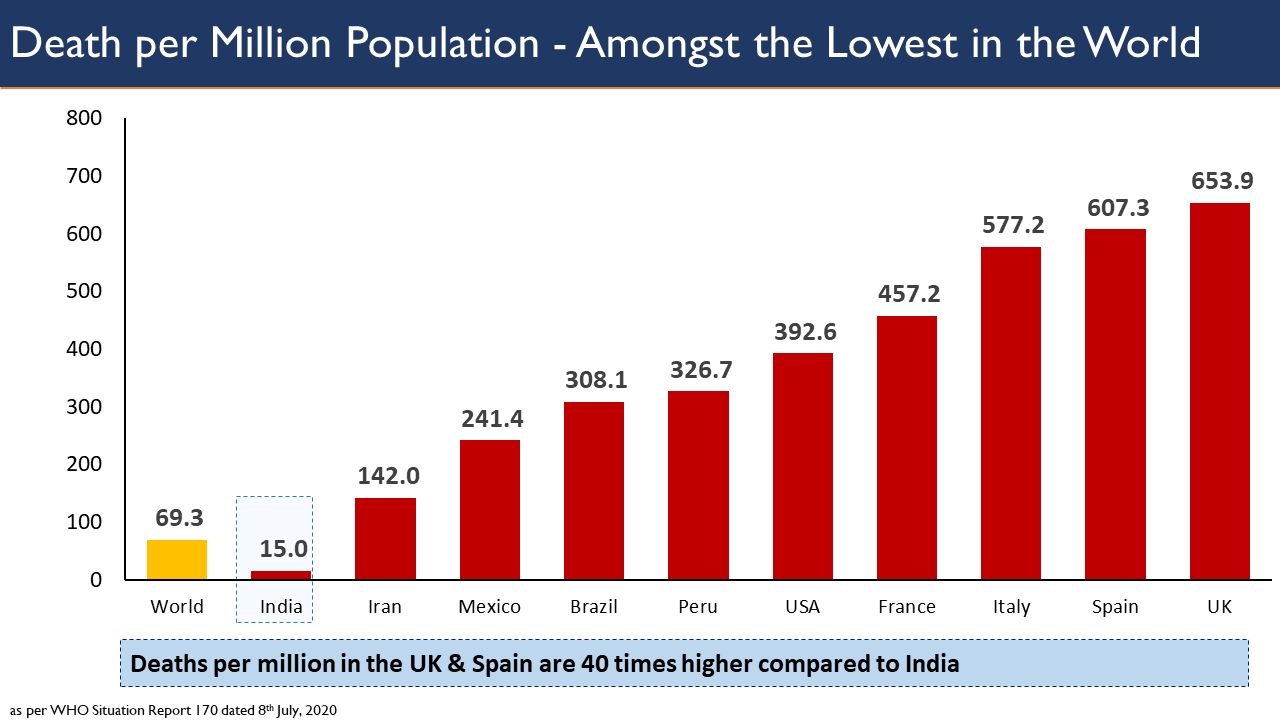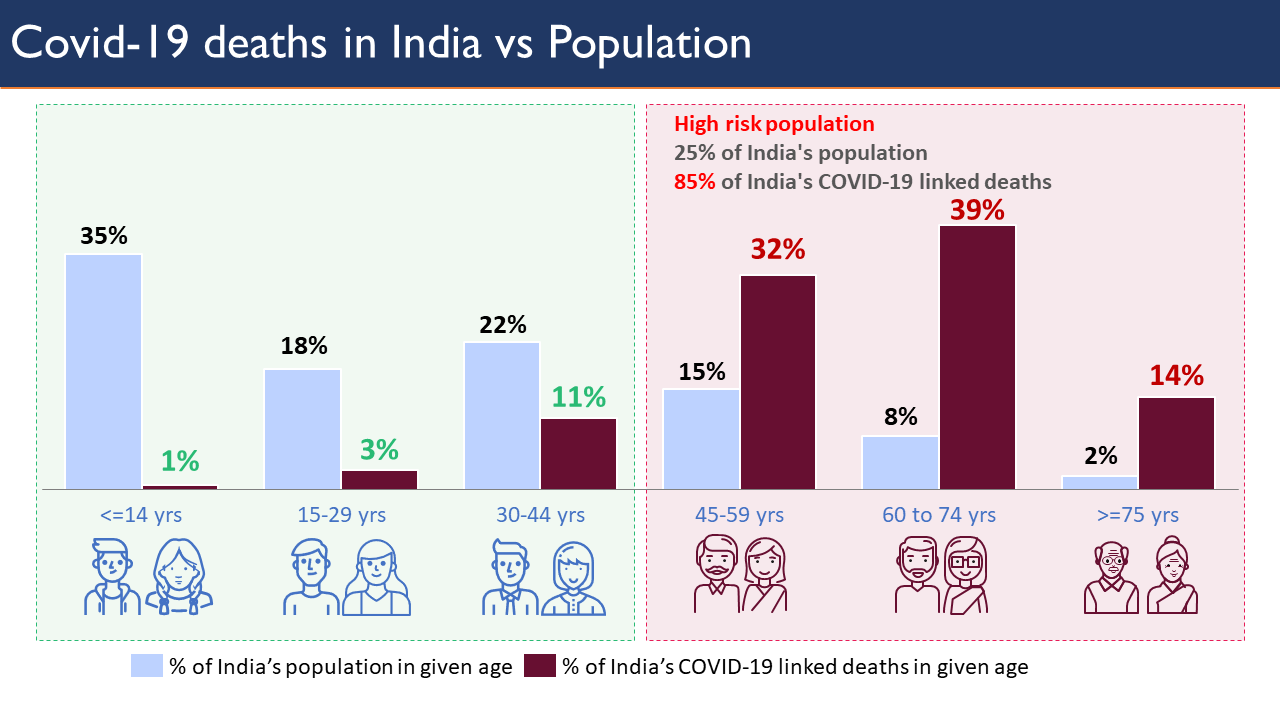Ministry of Health and Family Welfare
Gap between active and recovered COVID-19 cases is progressively increasing: Health Ministry
India has not yet entered the stage of community transmission of COVID-19, reiterates Health Ministry
COVAXIN and ZyCov-D have concluded animal toxicity studies, they will go for human trials: Health Ministry
DCGI has asked drug manufacturers to set up 24/7 helplines where patients & caregivers can contact in case of non-availability or overcharging of drugs: Health Ministry
Private labs have now been allowed to apply for NABL accreditation and in parallel submit their application to ICMR, so that accreditation can be completed in a month and COVID-19 testing may start: ICMR
ICMR to do follow-up pan India serological study
Posted On:
09 JUL 2020 6:11PM by PIB Mumbai
New Delhi / Mumbai, July 9, 2020
The gap between active COVID-19 cases and recovered cases is progressively increasing in the country. As on July 9, 2020, the recovery rate stands at 62.09%. Shri Rajesh Bhushan, Officer-on-Special Duty, Ministry of Health and Family Welfare said that the rate of increase of recovery is appreciable. He was addressing a media briefing on COVID-19, held at National Media Centre, New Delhi today. Presently the case load of COVID-19 is around 2.69 lakh in the country, while more than 4.76 lakh patients have already recovered. Hence, recovered cases are 1.75 times more than active cases, further stated Shri Bhushan.

Shri Bhushan further briefed, number of COVID-19 cases per million population in India continues to be among the lowest in the world. As per WHO Situation Report, India has 538 cases per million population. In comparison, no. of cases in some countries is at least 16 - 17 times more than that of India. Similarly, 15 COVID-19 deaths per million population has occurred in India, which also happens to be amongst the lowest in the world. In some countries it is 40 times higher in comparison. Despite being the second most populous country of the world, India has been able to manage COVID19 relatively well, he said.

Presenting an analysis of COVID-19 deaths vis-a-vis population in terms of age groups, Shri Bhushan said, 15% of COVID-19 deaths have occurred in people below 45 years of age, while 53% deaths have been among senior citizens. The high risk population are those aged above 45 years who form 25% of the country's population, but 85% of all COVID-19 deaths have occurred in this group. Further, more than half (53%) of deaths have been reported among people above 60 years of age, who form only 10% of the country's population. The OSD urged that the high-risk age group requires special attention by the Centre, states and UTs. The presentation given by the Health Ministry can be accessed here.

Private labs have now been allowed to apply for NABL accreditation and in parallel submit their application to ICMR, they can complete accreditation in one month. This has been stated by Nivedita Gupta, Senior Scientist, ICMR. 1,132 testing labs are now operational, including CBNAAT and TrueNat labs. More are in pipeline, as a result of efforts taken by ICMR and the mentor institutions, further briefed the senior scientist. This apart, ICMR also came up with an explicit advisory on the use of antibody-based IgG assays which are recommended as a surveillance tool. Further, all the NABH hospitals and NABL approved labs have been approved for conducting the antigen-based test. We are testing more than 2.6 lakh COVID-19 samples per day, which may be further increased with the use of Antigen Tests, she informed.
The ICMR Representative also stated, TrueNat & CBNAAT tests have been deployed recently, in addition to RT-PCR. She further said, a Rapid Antigen Point of Care Test too has been validated, which is being used in containment zones & hospitals. All these steps are being done with the approach of test, track and treat. With the ramped up COVID-19 testing, ICMR is hoping to identify more individuals at early stage of infection and lower burden on hospitals. “This strategy has taken up well”, said the Senior Scientist of ICMR.
Joint Secretary, Ministry of Home Affairs, Ms. Punya Salila Srivastava briefed that, more activities have been opened up outside containment zones as per Unlock 2 guidelines which came into effect from July 1, 2020. Since almost all economic activities have been allowed to resume, it has now become very essential to follow National Directives on COVID-19, she added. Wearing masks, social distancing, ban on use of tobacco products and spitting in public places are some of those directives. The Joint Secretary further informed, MHA is continuously monitoring enforcement of these measures, in coordination with states. To improve the COVID-19 situation in Delhi and NCR, Home Ministry is regularly conducting high level meetings with the concerned states and some major decisions have been taken, further stated the Joint Secretary.
In reply to a media query, Shri Bhushan stated, India has not yet entered the stage of community transmission of COVID-19. This has been clarified by the Union Health Minister Dr. Harsh Vardhan as well, after the meeting of Group of Ministers. Further, 49 districts alone account for 80% of COVID-19 cases in the country. By following the contact tracing protocols, we are able to trace and track all close contacts of reported COVID-19 cases within 72 hours. In such a scenario, it is not justified to say that there is community transmission, he added.
On the issue of a study by World Health Organisation which indicates that the virus may be airborne, Shri Bhushan said, it is an evolving situation and that the Union Health and Family Welfare Ministry is keeping itself abreast on this particular aspect. He further suggested that maintaining a physical distance of 6 feet, as is being repeatedly advised by the Centre, will help us in containing the spread of the infection.
While answering another query posed by the media, the OSD said, two entirely indigenous Indian vaccine candidates - COVAXIN by Bharat Biotech Ltd. and ZyCov-D by Zydus Cadila - have concluded animal toxicity studies after approval and the toxicity data has been shared with Drugs Controller General of India (DCGI). They will now go for human trials, he said.
Shri Bhushan also informed, DCGI has asked drug manufacturers to set up 24/7 helplines where patients & caregivers can contact in case of non-availability or overcharging of drugs. They have also been asked to put their distribution network details on their websites.
In reply to another query, Shri Bhushan said, most mathematical models focus only on behaviour of COVID-19 virus, not on response of national and state governments or of community. We will get better results if we focus more on containment and management measures, he added.
Shri Bhushan also informed that ICMR is planning to do a pan India serological study, as a follow-up to the sero survey conducted earlier. He also said that a symptomatic person who has been tested as negative for COVID-19 based on a rapid antigen test must go for an RT-PCR test.
In answer to a query on plasma therapy, the OSD said, it has been added as a form of investigational therapy; where it may be used has been specified in clinical guidelines issued by the Health Ministry. Randomized trials are being conducted under the aegis of ICMR, he further added.
****
DJM/SC
Follow us on social media:  @PIBMumbai
@PIBMumbai  /PIBMumbai
/PIBMumbai  /pibmumbai
/pibmumbai  pibmumbai[at]gmail[dot]com
pibmumbai[at]gmail[dot]com
(Release ID: 1637581)
Visitor Counter : 547